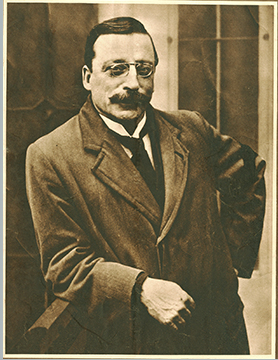The ‘German plot’
Published in Issue 3 (May/June 2018), Volume 26By Joseph E.A. Connell Jr

Above: Arthur Griffith—amongst the 73 Sinn Féin leaders arrested on 17–18 May 1918. (New York Times)
The conference was convened primarily as a protest against conscription measures, which the British parliament passed on 16 April 1918. The following resolution was agreed:
‘Taking our stand on Ireland’s separate and distinct nationhood and affirming the principle of liberty that the governments of nations derive their just powers from the consent of the governed, we deny the right of the British government or any external authority to impose compulsory military service in Ireland against the clearly expressed will of the Irish people. The passing of the Conscription Bill by the British House of Commons must be regarded as a declaration of war on the Irish nation. The alternative to accepting it as such is to surrender our liberties and to acknowledge ourselves slaves. It is in direct violation of the rights of small nationalities to self-determination, which even the prime minister of England—now preparing to employ naked militarism and force his Act upon Ireland—himself officially announced as an essential condition for peace at the Peace Congress. The attempt to enforce it will be an unwarranted aggression, which we call upon all Irishmen to resist by the most effective means at their disposal.’
The Catholic hierarchy concurred with this declaration at their annual meeting at Maynooth and declared in their own manifesto:
‘An attempt is being made to force conscription on Ireland against the will of the Irish nation and in defiance of the protests of its leaders. In view especially of the historic relations between the two countries from the very beginning up to this moment, we consider that conscription forced in this way upon Ireland is an oppressive and inhuman law, which the Irish people have a right to resist by every means that are constant with God.’
An anti-Conscription pledge was set forth:
‘Denying the right of the British government to enforce compulsory service in this country, we pledge ourselves solemnly to one another to resist conscription by the most effective means at our disposal.’
In this fashion the British plan to introduce conscription in Ireland led to widespread support for independence and fuelled support for the republican separatist movement and Sinn Féin.
In a heavy-handed attempt to quell this reaction to conscription, the British viceroy, Lord French, claimed that there was evidence of a treasonable ‘German plot’ between Sinn Féin and the German military, and those involved in the ‘plot’ were to be arrested. One of Collins’s spies, Thomas Gay, the librarian at the Dublin City Library, gave the information about the arrests to Harry Boland; Boland passed the information along to Michael Collins, who told the cabinet. Éamon de Valera, however, advised that they should all remain at home that night and many of the cabinet members were duly arrested.
The arrests that followed on 17–18 May 1918 included 73 Sinn Féin leaders, among them Griffith, Maud Gonne MacBride, Darrell Figgis and de Valera, and had severe unintended effects, as many of those arrested were among the most moderate of the nationalist leaders. Those left free included the most strident separatists, including Michael Collins, Cathal Brugha, Richard Mulcahy and Harry Boland.
Ironically, on 17 May the British authorities in London had decided not to implement conscription in Ireland, but by then the reaction had solidified support for Sinn Féin. The ‘German plot’ arrests led more people to embrace Sinn Féin throughout the country.
Joseph E.A. Connell is the author of Michael Collins: Dublin 1916–22 (Wordwell Books).
















